What were the two months of the Travelling Docudays UA-2022 during wartime like
What were the two months of the Travelling Docudays UA-2022 during wartime like
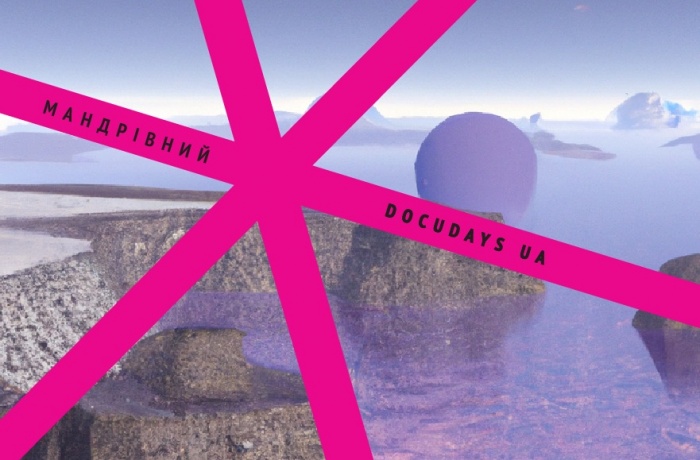
The Travelling Docudays UA-2022 took place, despite shelling and blackouts! From 12 November to the end of December, audiences all over Ukraine and even abroad watched talented documentary films offline and online. They also participated in discussions and human rights events. We share the results and incredible moments of the most impressive Travelling Festival.
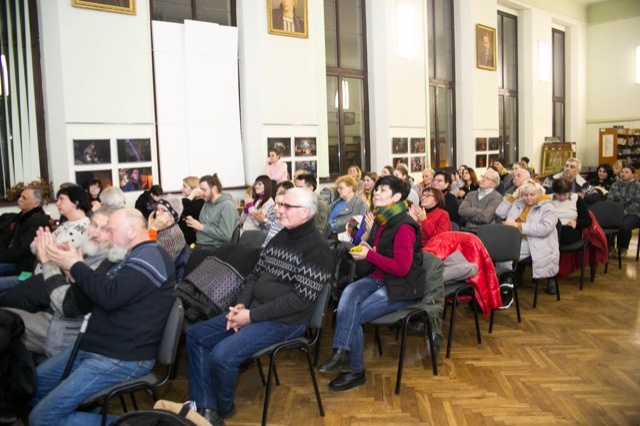
Opening of the 19th Travelling Docudays UA in Lviv
This year's Festival was held in a shortened period, but this did not prevent us, together with our regional partners, from creating a rich programme and holding all the planned events. In particular, 218 offline film screenings took place in 17 regions of Ukraine! For the first time, an audience from abroad joined the Festival: from Germany, Israel, Norway, and Poland. In total, offline and online, we held 251 screenings and 82 events.
The Travelling's Docudays UA programme included 19 films: a block of short films made by Ukrainian directors after the start of the full-scale invasion, as well as foreign and Ukrainian films from the 19th DOCUDAYS UA programme, which the team was preparing last winter for screenings in the cinemas of peaceful Kyiv.
The theme of the Festival, "State of emergency", was very close and understandable to all viewers. Together we discussed new realities and how to adapt to them in every sphere of life, shared experiences and problems, and searched for and found new meanings and points of resistance.
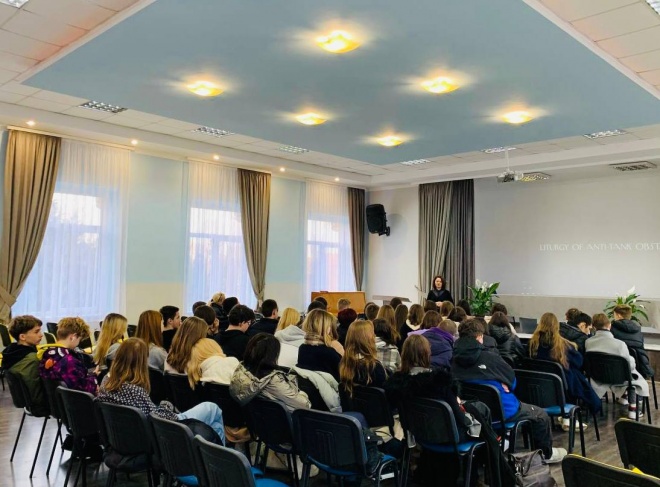
The 19th Travelling Docudays UA in Uzhhorod
The journey began on 12 November 12 in Lviv with a flash mob in support of Maksym Butkevych, a friend of the Festival and a human rights activist who is still in Russian captivity, and a film screening of the documentary-animated story Tales of a Toy Horse by Ulyana Osovska and Denis Strashny.
Traditionally, events of the human rights programme RIGHTS NOW! took place during the Festival. These are five conversations in an online format, where together with experts we discussed how to work with the consequences of the war. In particular, what experience should be taken into account in the medical system reform, how to save the environment and document losses, and what Ukrainian society will be like after victory.
The journey of the Travelling Festival was full of special events and many 'first times', and all this during a full-scale war! The Festival travelled abroad, 8 screenings were held in the cities of Germany, Israel, Norway, and Poland.
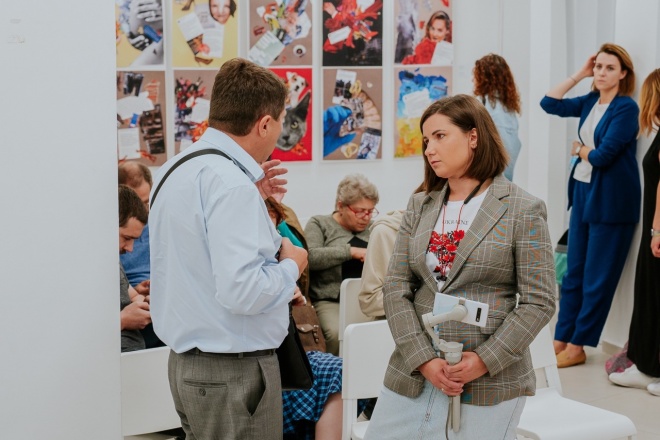
The 19th Travelling Docudays UA in Tel Aviv, Israel
Also, several of our coordinators held a festival for the audience of two regions or cities at once, their native region and the one where they had to temporarily move due to the war: Mariupol and Dnipro, Zaporizhzhia and Lviv Oblast, Kharkiv Oblast and Cherkasy. The regional coordinators did not leave their audiences without the opportunity to watch documentary films, meet together and talk about their pain. By the way, this is how the Travelling Festival first visited Cherkasy.
As part of this year's Festival, we implemented a special project, "Why Ukrainians win". These are 11 stories of resilience about the invincibility, struggle, and victories of regional coordinators of the Travelling Docudays UA, which were published weekly on the Travelling Festival and Suspilne websites.
Together with the films, the exhibition "Unconquered Kherson" by Oleksandr Korniakov, a photo correspondent of Vgoru Media Platform, travelled around the country. This is a photo story about the thirst for freedom of the brave and fearless people of Kherson, about their resistance to the Russian occupation. During the Travelling Docudays UA, the exhibition visited Cherkasy, Dnipro, Lutsk, Ternopil, Lviv, Chornomorsk, Zaporizhzhia, Khmilnyk, Chortkiv, and Zaporizhzhia. The exhibition presentation took place in a shelter during air raids and with flashlights due to a blackout. But this did not stop the visitors, they listened to stories about the struggle of Kherson firsthand and shared the stories of their resistance.
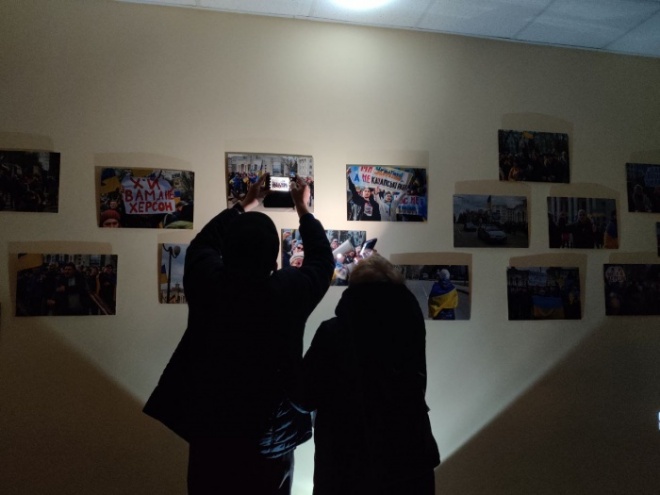
The exhibition "Unconquered Kherson" by Oleksandr Korniakov within the 19th Travelling Docudays UA in Cherkasy
During December, the creative teams and the film protagonists of the festival programme joined about 40 online discussions. In particular, they discussed the films: Cry My River with director Olesia Morhunets, A House Made of Splinters with line producer and second director Azad Safarov and protagonist Margaryta Burlutska, The Hamlet Syndrome with protagonist Oleh-Rodion Shuryhin-Herkalov, Fortress Mariupol. Orest with the Azov hero Dmytro Kozatsky with the call sign "Orest", Peace and Tranquility with the director Myro Klochko, Mountains and Heaven in Between with the director Dmytro Greshko, The Bright Path with the director Iryna Riabenka, as well as The Last Generation with the participation Polish director and eco-activist Mikołaj Borowy. And the directors of the film The Hamlet Syndrome Elwira Niewiera and Piotr Rosołowski came to the Lviv screening of the film at the Jam Factory Art Center with a humanitarian mission bringing generators.
The Travelling Docudays UA ended with two events at once: an offline screening of the film Mountains and Heaven in Between in Odesa and an interactive class, "Restrictions of Human Rights in Wartime", in Sumy on 30 December.
We held this year's Festival with the most challenges and risks, but it turned out really incredible and will be remembered by the team for a lifetime. It became possible thanks to our amazing and tireless 26 regional coordinators. They were not stopped by regular blackouts of electricity and heat, enemy missiles, and air raid sirens. We are sincerely grateful and admire our colleagues' strength of spirit and will. And we believe that there are many joint achievements and successes ahead of us, and the greatest victory is the victory of Ukraine!
The 19th Travelling Docudays UA in Lviv
The 19th Travelling Docudays UA was held with support from the Embassy of Sweden in Ukraine, the Stabilisation Fund for Culture and Education 2022 of the German Federal Foreign Office and the Goethe-Institut, and the Polish Institute in Kyiv. The Festival's inclusivity is supported by Oschadbank and Mastercard. The opinions, conclusions, or recommendations do not necessarily reflect the views of the governments, charities, or companies of these countries. Responsibility for the content of the publication lies exclusively on the authors and editors of the publication.












